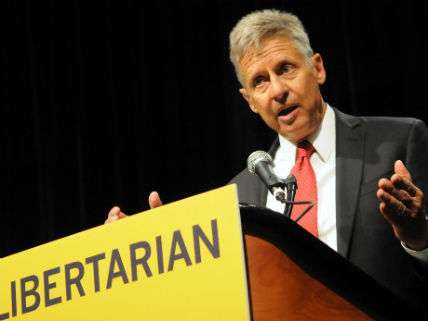Gary Johnson On Science Policy
Libertarian Party presidential candidate scores pretty well.

To be a good president, a candidate must be able to evaluate data. So early last year, I scored six likely Republican presidential candidates on their positions on seven science policy areas. The notion that the reality-TV star Donald Trump would actually run for president seemed farfetched at that point, so I didn't get around to evaluating his views until more recently.
The seven policy topics were climate change, genetically modified crops, the Yucca Mountain nuclear waste facility, vaccination, fetal pain legislation, biological evolution, and a proposed ban on commercial travel from West African countries during the recent Ebola outbreak. I chose those topics because we have widely accepted data for each of them. Specifically: The trend toward higher global average temperature over the past 50 years is at least partially the result of human activity; genetically modified crops are safe; Yucca Mountain in Nevada can safely store nuclear waste for tens of thousands of years; vaccinations do not cause autism; fetuses do not feel pain before 24 weeks of gestation; biological evolution explains the diversity of life; and a major Ebola outbreak in the U.S. was unlikely and banning travel is counterproductive.
So how do Gary Johnson and William Weld—the Libertarian Party's candidates for president and vice president, respectively—score with regard to the science policy issues?
Gary Johnson:
Climate Change: At the Libertarian Party convention in May, Johnson said, "I'm not smart enough to say whether or not global warming is man made, certainly there is climate change." This is a change from his earlier views. In 2011, he told Rolling Stone: "I accept the fact that there is global warming and I accept the fact that it's man caused. That said, I am opposed to cap and trade. I'm a free market guy when it comes to the clean environment the number-one factor when it comes to the clean environment is a good economy." HALF POINT
Biotech Crops: In a debate of third-party presidential candidates aired on RT in 2012, Johnson stated that "genetically modified foods should be labeled as such." I could find no statements from him regarding the safety of biotech crops. It's worth noting that he also favors mandatory nutrition labeling. His stance on food labeling apparently stems from the fact that he suffers from celiac disease and he wants to know when foods contain gluten. PASS (but worrisome)
Yucca Mountain: Interviewed by Liberty Voice in 2012, Johnson said: "I really got to be well versed on high level radioactive waste, given that in New Mexico, Mescalero was looking to open a retrievable storage site, and I know about WIPP [Waste Isolation Pilot Plant], and what I've heard second-hand is that Yucca Mountain was politically driven and not scientifically based. Why not have monitored retrievable storage at every nuclear site instead of a repository like Yucca Mountain? These are just questions I have, I don't have the answers." Interestingly, when Johnson was governor of New Mexico he did not oppose the construction of the WIPP in his state to store relatively low-level radioactive waste. In fact, he supported efforts to use the facility for additional research. FAIL
Vaccination: I can find no statements from Johnson suggesting that he thinks that vaccination might cause autism. In 2015, Our America Initiative, a non-profit co-founded by Gary Johnson, announced that it supported a Mississippi advocacy group's effort to place "childhood vaccination decisions into the hands of parents and doctors." PASS
Fetal Pain: In 2011, Johnson refused to endorse the Pain-Capable Unborn Child Protection Act. With regard to abortion, Johnson observed in an April interview: "Abortion is an unbelievably difficult decision that anyone should have to make. But only a woman should make it." PASS
Evolution: In 2012, On The Issues asked Johnson: "Do you support the theory of evolution?" He answered: "Yes." PASS
Ebola: In October 2014, Johnson said that marijuana has "efficacy in regard to treating Ebola." He later clarified that he meant additional research should be conducted to determine the potential curative effects of the drug for Ebola patients. I found no information suggesting that Johnson favored an Ebola travel ban. PASS
Total: a generous 5½ out of 7 possible points. Considering that none of the Republican candidates—including Trump—scored higher than 3, Johnson is doing pretty well.
Finding out where Weld stands on these seven science policy issues has proved more challenging, probably because he was more or less out of public life for the last few years. The only one for which I could find information is climate change.
In 2008, during an interview on Fox News, Weld declared that "global warming and climate change is an issue that affects absolutely everybody." During that same interview he suggested that setting a price on carbon would be necessary for "a national, international cap and trade system, [and] climate change legislation" to work. Interviewed as job losses mounted during the onset of the Great Recession, Weld also suggested that $150 billion program to fund clean tech jobs could also usefully cut greenhouse gas emissions. Weld has apparently long favored government programs that would encourage energy efficiency. No score.
